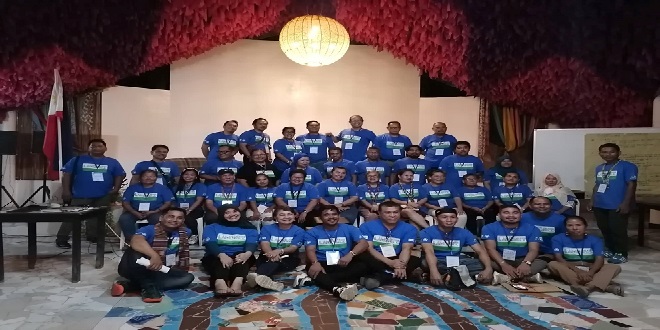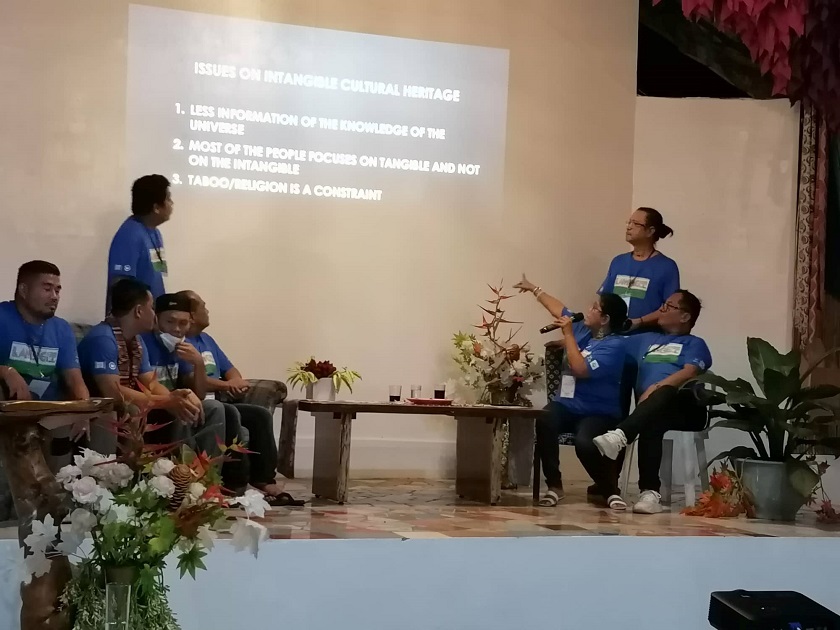
Following the 2022 Regional Caucus, the CCP Kaisa Sa Sining (KSS) Mindanao Network successfully organized the Lambigit Conference from May 17 to 20, 2023 in Davao de Oro.

In collaboration with the Ramon Magsaysay Memorial Colleges Marbel, Tagum City Council of Women, and Musikahan sa Tagum Foundation, the conference was facilitated by the Cultural Center of the Philippines Cultural Exchange Department (CCP CED).
More than 35 participants, including Indigenous Peoples Representatives (IPMRs) and Barangay Leaders (BLs), attended the conference from 12 cultural communities across Mindanao, namely Maguindanao, Sama, Blaan, Manobo, Higaonon, Subanen, Yakan, Mansaka, Tagakaulo, Liboganon, Kagan, and Pagsabagan. Additionally, 10 KSS representatives from Marawi, Iligan, Maguindanao, Pagadian, Zamboanga del Sur, Tagum, Lamitan, Agusan del Sur, Koronadal, and General Santos also participated.
Lambigit, which means collaboration, work together, and network in the local language, aimed to bring together local leaders representing various multicultural grassroots communities linked to the KSS Network. The objective was to discuss the current state of the Intangible Cultural Heritage (ICH) in their respective communities.
During the workshop, the participants collectively formulated a Culture-and-Development Agenda, focusing on the preservation of the ICH of the multicultural peoples of Mindanao. The conference also aimed to enhance collaboration and partnerships among the KSS network members in Mindanao, local barangay leaders, and IPMRs in safeguarding the identified priority ICH.
Lambigit was designed and facilitated by Nestor T. Horfilla, a CCP Gawad Awardee and CCP KSS Mindanao Gador Awardee from Davao City. Horfilla received assistance from KSS co-facilitators Renefe Tremedal, Cecile Mambuay, Thallah Alava, Pepito Sumayan, and Lolito Pontillas.
The conference forum utilized dialogical processes and participatory learning methodologies. It began with presentations of case studies on IP and Moro initiatives related to culture and development, focusing on the factors that hinder or facilitate progress and the urgent need for sustainability. The case studies were based on documented experiences and findings from focus group discussions (FGDs) conducted in Maguindanao (for BARMM), Davao (for multicultural communities), and Zamboanga (involving representatives from Subanen and Yakan communities).
Three culture-ecology-based focused groups were formed (Zambasuli, BARMM, Eastern-Mindanao) to outline their area-based Collaborative Culture and Development Agenda and draft an Action Plan for Promoting Cultural Diversity and Safeguarding Intangible Cultural Heritage of multicultural communities in Mindanao.
The expected concrete outcomes of Lambigit included: (1) documented case studies and KSS recommendations to be shared with culture-and-development agencies such as NCCA, NEDA, NCIP, OPAPP, BARMM-BCPCH, and the Committee on Culture in Congress for further discussion and policy formulation; (2) a KSS Action-Agenda for Protecting Cultural Diversity to be presented for support and funding to NCCA, UNESCO-Philippines, and the Senate Committee on Culture; and (3) an Agreed Action Plan (2023-2028) for KSS members to adapt or replicate for implementation.
Lambigit marked the fourth collaborative project planned and executed by CCP KSS Mindanao from 2022 to 2023, with support from the CCP Congressional Initiatives Fund and facilitation by the CCP CED.




